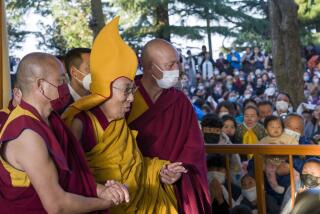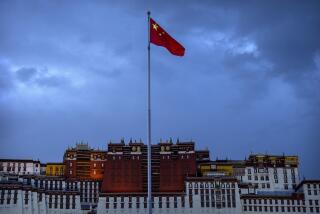Chinese Official Denounces Dalai Lama
- Share via
WASHINGTON — Chinese Foreign Minister Wu Xueqian on Wednesday made an extraordinary public denunciation of the Dalai Lama, spiritual leader of Tibet’s Buddhists, calling him a political exile who “has far exceeded his capacity as a religious figure.”
Speaking at a press conference closing out his three-day visit to Washington, Wu made it clear that China is planning to adopt a tough stance toward Tibet after a new outbreak of violence by Tibetans against Chinese rule.
The Dalai Lama, he said, “is an exile who attacks and smears the People’s Republic of China. . . . He has carried out frantic activities abroad. Such activities are unacceptable to the Chinese people.”
Although China has criticized the Dalai Lama in the past, it usually has done so through the government-controlled press or through lower-level officials. Wednesday’s attack came from one of China’s leading officials during an official trip to Washington. Wu’s remarks appeared to be aimed at warning the United States that China will not tolerate strong criticism of its Tibet policies.
The Dalai Lama had sent a letter to President Reagan on Monday, asking him to “voice concern” to the Chinese government about the situation in Tibet. The President did not raise the subject in a 40-minute session with Wu. Secretary of State George P. Shultz was said to have expressed concern about human rights in Tibet in his meetings with Wu.
Over the last six centuries, Tibet has sometimes been affiliated with China and has sometimes been independent. After the victory of the Communist revolution of 1949, China moved troops into Tibet and kept them there. The Dalai Lama, who had ruled as spiritual and political leader of Tibetan Buddhists, was forced to flee to India after an abortive Tibetan revolt against Chinese rule in 1959.
Unrest in Tibet turned violent last Oct. 1, a few days after the Dalai Lama called a press conference in Washington to attract attention to the plight of Tibetans under Chinese rule. When Tibetans rioted in Lhasa, Chinese policemen opened fire. As many as 14 people are said to have been killed.
Called for Independence
Similar rioting erupted last weekend, when 300 young monks reportedly began calling out for Tibetan independence. According to the State Department, between three and nine people were killed. In addition, official Chinese news reports indicate that more than 300 police officers were injured.
In his letter to Reagan, the Dalai Lama said: “At the present moment, my people are enduring the harshest wave of repression to be visited upon them since the Cultural Revolution. Their sole hope lies with international opinion and the check it can provide on Chinese policy in Tibet.”
In his press conference, Wu said the Dalai Lama’s suggestions for talks on Tibet are “preposterous.” When asked whether China would permit Western reporters to visit Tibet, he said, “We not only welcome Western journalists but all other people who want to go to Tibet for business and tourism.”
Chinese authorities ordered all Western reporters to leave Tibet during the disturbances last October and permitted only three correspondents in for the prayer festival that led up to the weekend riots.
Wu declined to say whether China is transferring arms to Iran through third parties. But he repeated previous Chinese assurances that China has “adopted strict measures” to prevent one kind of weapon, the Silkworm anti-ship missile, from reaching Iran.
The United States froze the liberalization of rules for export of high-technology equipment to China last fall after Iran fired Silkworm missiles at U.S.-flagged ships and facilities in the Persian Gulf.
Tuesday night, citing the new Chinese assurances about the Silkworm, the United States announced that it will reverse its policy and open the way for new levels of technology to be exported to China.
More to Read
Sign up for Essential California
The most important California stories and recommendations in your inbox every morning.
You may occasionally receive promotional content from the Los Angeles Times.













